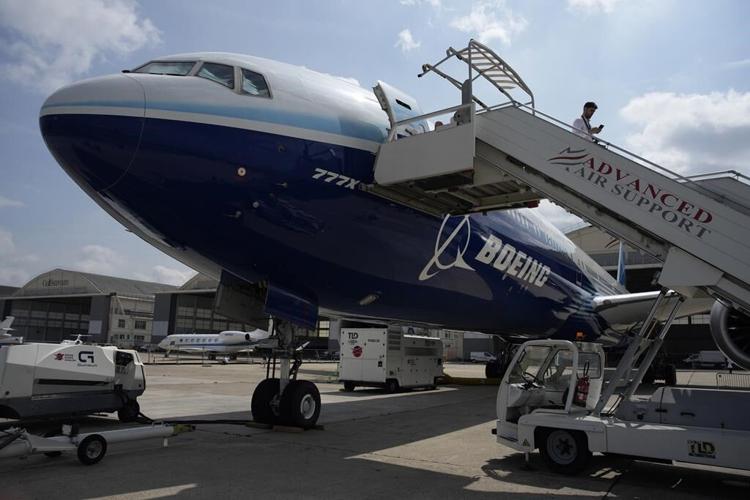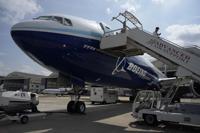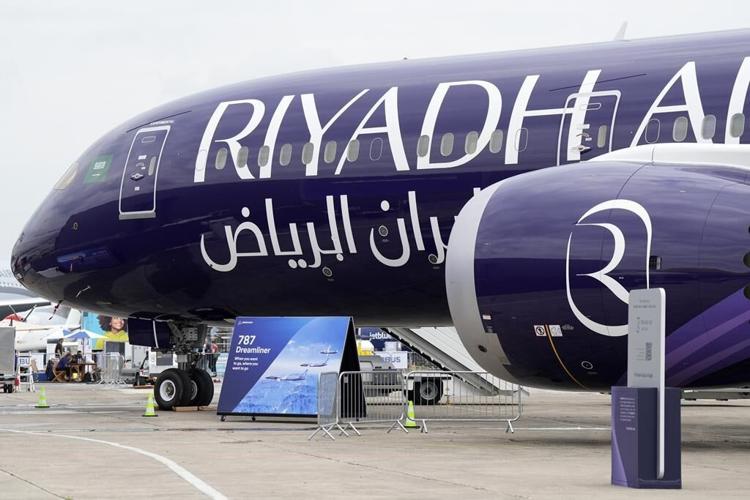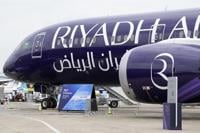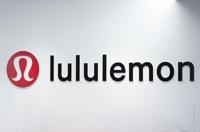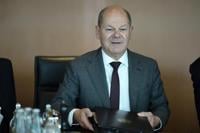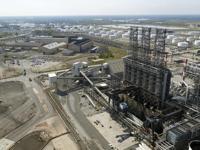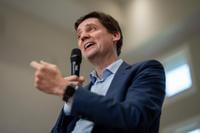When it comes to flying, going green may cost you more. And it's going to take a while for the strategy to take off.
this week at the Paris Air Show, the world’s largest event for the aviation industry, which faces increasing pressure to reduce the climate-changing greenhouse gases that aircraft spew.
Even the got a emissions-reduction spin: Airlines and manufacturers said the new planes will be more fuel-efficient than the ones they replace.
But most of those planes will burn conventional, kerosene-based jet fuel. Startups are working feverishly on , but they won't catch on as quickly as electric vehicles.
“It's a lot easier to pack a heavy battery into a vehicle if you don't have to lift it off the ground,” said Gernot Wagner, a climate economist at Columbia University.
That means sustainable aviation fuel has become the industry's best hope to achieve its promise of by 2050. Aviation produces 2% to 3% of worldwide carbon emissions, but its share is expected to grow as travel increases and other industries become greener.
Sustainable fuel, however, accounts for just . Made from sources like used cooking oil and plant waste, SAF can be blended with conventional jet fuel but costs much more.
Suppliers are “going to be able to kind of set the price," Molly Wilkinson, an American Airlines vice president, said at the air show. "And we fear that at that point, that price eventually is going to trickle down to the passenger in some form of a ticket price.”
With such a limited supply, critics say airlines are making overly ambitious promises and exaggerating how quickly they can ramp up the use of SAF. The industry even has skeptics: Nearly one-third of aviation sustainability officers in a GE Aerospace survey by 2050.
in U.S. federal court by critics who say the carrier falsely bills itself as the world’s first carbon-neutral airline, and that Delta's claim rests on carbon offsets that are largely bogus. The Atlanta-based airline says the charges are “without legal merit.”
Across the Atlantic, a consumer group known by its French acronym, BEUC, filed a complaint this week with the European Union’s executive arm, accusing 17 airlines of .
The group says airlines are misleading consumers and violating rules on unfair commercial practices by encouraging customers to pay extra to help finance development of SAF and offset future created by flying.
In one case, the group's researchers found Air France charging up to 138 euros ($150) for the green option.
“Sustainable aviation fuels, they are indeed the biggest technological potential to decarbonize the aviation sector, but the main problem ... is that they are not available,” said Dimitri Vergne, a senior policy officer at BEUC.
“We know that before the end of the next decade — at least — they won’t be available in massive quantities" and won’t be the main source of fuel for planes, Vergne added.
Producers say SAF reduces greenhouse gas emissions by up to 80%, compared with regular jet fuel, over its life cycle.
Airlines have been for years. They were rattled by the rise of “flight shaming,” a movement that encourages people to find less-polluting forms of transportation — or reduce travel altogether.
The issue gained urgency this year when European Union negotiators agreed on new rules starting in 2025 and rising sharply in later years.
The United States is pushing incentives instead of mandates.
A law signed last year by President Joe Biden will provide tax breaks for , but one of the credits will expire in just two years. Wilkinson, the American Airlines executive, said that was too short to entice sustainable fuel producers and that the credit should be extended by 10 years or longer.
The International Air Transport Association, an airline trade group, estimates that SAF could contribute 65% of the emissions reductions needed for the industry to hit its 2050 net-zero goal.
But very few flights are powered by SAF because of the limited supply and infrastructure.
Just before the , President Emmanuel Macron announced that France would contribute 200 million euros ($218 million) toward a 1 billion euro ($1.1 billion) plant to make SAF.
Many airlines have touted investments in SAF producers such as World Energy, which has a plant in Paramount, California, and Finland’s Neste.
United Airlines plans to triple its use of SAF this year, to 10 million gallons — but it burned 3.6 billion gallons of fuel last year.
Some see sustainable fuel as a bridge to cleaner technologies, including larger electric planes or . But packing enough power to run a large electric plane would require a fantastic leap in battery technology.
Hydrogen must be chilled and stored somewhere — it couldn't be carried in the wings of today's planes, as jet fuel is.
“Hydrogen sounds like a good idea. The problem is the more you look into the details, the more you realize it’s an engineering challenge but also an economics challenge," Richard Aboulafia of AeroDynamic Advisory, an aerospace consultancy, said at the Paris Air Show. “It’s within the realm of possibility, (but) not for the next few decades.”
___
This story has been corrected to note that Wagner is at Columbia University, not New York University.
Koenig reported from Dallas. AP journalists Jade Le Deley and Tristan Werkmeister in Le Bourget, France, and Kelvin Chan in Toronto contributed.

